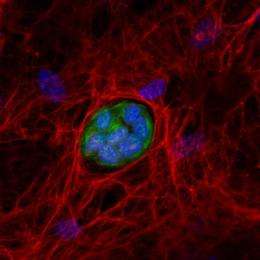Nipping metastases in the bud: A novel strategy for fighting cancer targets secondary tumors

The proliferation of metastases is often the main cause of complications and death from cancer. For the first time, researchers are looking very closely at the development of these metastases themselves, instead of focusing on the "primary" cancers from which they originated. In doing so, a team from the Swiss Center for Experimental Cancer Research (ISREC), at EPFL, was able to isolate a protein that plays a major role in metastasis development, and showed that the formation of secondary cancers could be prevented by blocking this protein.
Their results will be published December 7, 2011, in the advance online edition of the journal Nature and will open the door to new therapeutic options for treating late stage cancers.
A vital protein for metastases
The researchers already knew that cancer cells spread widely throughout the body once a malignant tumor is established. These cells don't always result in a secondary cancer, however. It turns out that all cancer cells aren't created equal: only some of them, known as "cancer stem cells," can initiate metastases. And in order to do this, they must settle into a spot – a niche – that is conducive for their development.
The ISREC team was able to show that several conditions are necessary for cancer to propagate. "In particular, we were able to isolate a protein, periostin, in the niches where metastases develop," explains Joerg Huelsken, holder of the EPFL Debiopharm Chair in Signal Transduction in Oncogenesis. "Without this protein, the cancer stem cell cannot initiate metastasis; instead, it disappears or remains dormant."
Minimal side effects in mice
Periostin exists naturally as part of the extracellular matrix, and has been shown to play a role in fetal development. In adults, it is only active in specific organs – the mammary glands, bones, skin and intestine. This research appears to prove that it plays an essential role in the environment that a cancer stem cell needs in order to develop a metastasis. Mice that were bred to lack this protein are resistant to metastasis formation. "We developed an antibody that adheres to this protein, making it inoperative, and we are hoping in this way to be able to block the process of metastasis formation," says Huelsken.
These experiments that blocked the periostin protein resulted in very few side effects in the mice. "This doesn't necessarily mean the same will hold true in humans," the researcher cautions. "We're not even sure that we'll be able to find an equivalent antibody that will work in humans."
This discovery is nonetheless very encouraging, especially since we now know that malignant tumors tend to spread more quickly than was previously believed. Preventing the development of metastases would thus appear to be an important therapeutic option that could limit the deleterious effects of cancers.
More information: DOI: 10.1038/nature10694














